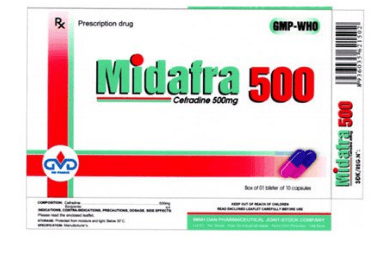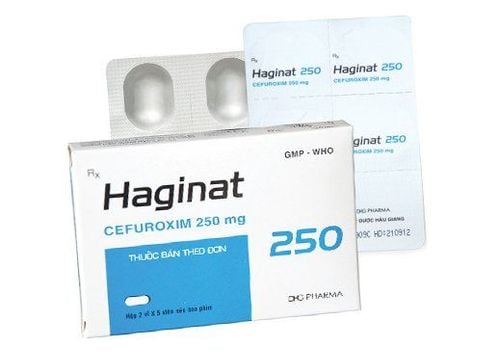This is an automatically translated article.
Kabzu drug with the main ingredient is Cefpodoxime, which is prepared in the form of film-coated tablets. The drug is indicated for the treatment of certain infectious diseases. Finding out enough information about dosage and how to use helps patients use the drug effectively.
1. What is Kabzu?
What is Kabzu drug? Kabzu drug is a drug belonging to the group of anti-parasitic, anti-infective, anti-viral, anti-fungal drugs - Kabzu contains Cefpodoxim 200 mg, packaged in the form of film-coated tablets.
2. Indications and contraindications to the drug Kabzu
2.1. Indications Kabzu is prescribed by doctors to treat the following infectious diseases:
Upper respiratory tract infections such as acute otitis media, sinusitis, tonsillitis and pharyngitis. Community-acquired acute pneumonia. Acute gonococcal infection but uncomplicated Urinary tract infection uncomplicated Skin and soft tissue infection Accordingly, patients need to adhere to the use of Kabzu drug according to the indications indicated on the instruction sheet or prescription sheet. prescription from a doctor or pharmacist.
2.2. Contraindications Kabzu is contraindicated in the following cases:
Patients with a history of hypersensitivity to cefpodoxime proxetil. Normally, patients who are allergic to any of the ingredients in the drug should not use the drug. Other cases are specified in the instructions for use or doctor's prescription. Contraindications of the drug Kabzu must be understood as absolute contraindications, that is, for no other reason that the contraindication can be flexible in taking the drug.
3. Dosage and how to take Kabzu
Dosage and how to take Kabzu medicine as follows:
3.1. How to use Kabzu is made in the form of film-coated tablets, so the drug is used orally. Patients need to adhere to the correct dosage to achieve the best treatment effect.
3.2 How to take Kabzu Adults
Upper respiratory tract infections, tonsillitis and pharyngitis: The dose is 100 mg every 12 hours for 10 days. Community-acquired acute pneumonia: 200 mg every 12 hours for 14 days. Uncomplicated acute gonococcal infection: 200 mg single dose. Uncomplicated urinary tract infections: 100 mg every 12 hours for 7 days. Skin and skin structure infections: 400 mg every 12 hours for 7-14 days. Children:
Acute otitis media: 10 mg/kg/day (maximum 400 mg/day in 2 divided doses) for 10 days. Pharyngitis and tonsillitis: Dose: 10 mg/kg/day (maximum 200 mg/day in 2 divided doses) for 10 days. The active ingredient Cefpodoxime should be administered with food. In patients with renal impairment (creatinine clearance less than 30 ml/min), the dosing interval should be increased to 24 hours. There is no need to adjust the dose of Kabzu in patients with cirrhosis.
It should be noted: Patients need to apply the exact dose of Kabzu prescribed on the package, the instruction sheet or the instructions of the consulting doctor or pharmacist. Absolutely do not arbitrarily calculate, apply or change the dose of the drug.
4. Overdose, missed dose and treatment
4.1. Kabzu drug overdose Patients need to strictly follow the instructions when prescribed by the doctor or the information contained in the drug leaflet. When using an overdose of Kabzu, the patient should stop taking it, and immediately notify the doctor or pharmacist for advice when the body has abnormal symptoms
In case of Kabzu overdose and the patient has symptoms In need of emergency, relatives should immediately call 911 for guidance and assistance. Family members should bring medical records, medications and medical history information to the doctor for early diagnosis and timely treatment.
4.2. Missed doses Usually medicines can be taken within 1-2 hours of the time specified in the prescription. Unless there are other strict regulations on the time of use, the patient can take Kabzu after a few hours of forgetting. However, if the time is too far from the time to take the prescribed dose, the patient should not make up for the dose, because it can be dangerous to health. To ensure safety, patients need to follow them properly or consult a doctor before making a decision.
5. Side effects when taking Kabzu
Side effects during the use of Kabzu that have been recorded in clinical trials are usually very mild and appear only transient, specifically as follows:
Diarrhea Nausea, vomiting Abdominal pain Colitis Inflammation Headache . Rarely, hypersensitivity reactions, rash, pruritus, dizziness, thrombocytopenia, thrombocytopenia, leukopenia or eosinophilia have occurred during the use of Kabzu.
Usually the side effects or unwanted effects, unwanted effects will go away when the patient stops using the drug. Therefore, if there are other rare side effects that are not listed in the leaflet, the patient should immediately inform the doctor or medical staff if there is any doubt about the side effects of the drug. Kabzu.
6. Precautions and notes when taking Kabzu
The subjects that need to be noted before using Kabzu are: the elderly, children under 15 years of age, people with liver failure, kidney failure, people with allergic sensitivities to the ingredients in the drug.. Or subjects with diseases such as myasthenia gravis, hepatic coma, stomach ulcers.Pregnant women: Although there have been clinical studies, there may still be risks during use. Therefore, it is best not to use Kabzu with pregnant women. If used, it is necessary to consult a specialist doctor carefully.
Lactating women: Breastfeeding mothers need to carefully weigh the benefits and risks. Absolutely do not arbitrarily use Kabzu without carefully reading the instructions for use and instructions of the doctor or pharmacist.
7. Kabzu drug interactions
Drug interactions are often complicated due to the ingredients and active ingredients present in the drug. Some possible drug interactions Kabzu may occur during use are as follows:
Plasma concentrations may be reduced by approximately 30% when Cefpodoxime proxetil is indicated in combination with antacids or H2 inhibitors. When cefpodoxime is prescribed concurrently with a nephrotoxic compound, renal function should be closely monitored. Plasma concentrations of cefpodoxime will be increased when cefpodoxime is co-administered with probenecid. Alteration of laboratory values: Cephalosporins may cause the direct Coomb test to be positive. In order to avoid unwanted drug interactions, before taking Kabzu, patients need to inform their doctor about drugs, herbs, and functional foods for the doctor to consider and give appropriate indications. fit.
Store Kabzu in a dry place, away from sunlight and at a temperature below 25 degrees Celsius. Keep Kabzu out of reach of children and pets.
In summary, the drug Kabzu has the main ingredient is Cefpodoxime which is prepared in the form of film-coated tablets. The drug is indicated for the treatment of certain infectious diseases. In order to ensure effective treatment and avoid unwanted side effects, patients need to carefully read the instructions for use and consult a doctor or pharmacist on how to use and dosage.













